A Modern Quaker Follows George Fox’s Example in Court

Reader Responses
Have you ever had to choose between your beliefs and the law?
Historically, Quakers have refused to take oaths because of their commitment to telling truth all the time. How does this resonate (or not) with your personal spiritual practice?
"When I was teaching at Jesuit High School, the contracts were changed to read a support of ALL Roman Catholic beliefs was required in and out of school. I spent some time in discussion with the school President indicating some concern in specific areas. He indicated that the change was not directed at me, as a Quaker, because they understood I was a good role model for the students, but that there were some individuals to whom it was addressed. He said he couldn't change the contract and didn't understand why I couldn't sign with his assurances. I replied that I was unable to sign the contract as written. Eventually after some time for reflection and discernment, I resigned."
Tom S., Lino Lakes, MN, USA
"It’s been my experience that there are accommodations in the courts, at least for affirmation rather than swearing. I’ve experienced this in both CT and VT and I’m grateful for this accommodation. On the whole, however, I feel uncomfortable that asking to affirm rather than swear puts me in the position of being selected out of jury duty by the attorneys. I believe that accepting jury service is an important civic responsibility. One thing I won’t do is pledge allegiance to the flag which I feel is an oath inconsistent with sound spiritual practice. This, I believe, would be a false declaration of loyalty inconsistent with my quest for spiritual integrity." Greg M., North Andover, MA, USA

This Week’s Messages
Mon Oct 14
The Story of the Incorrigible Quakers and Their Hats
“‘When we were brought into the court,’ says Fox, ‘we stood a pretty while with our hats on, and all was quiet, and I was moved to say, “Peace be amongst you!” “Why do you not put your hats off?” said the judge to us. We said nothing. “Put off your hats,” said the judge again. Still we said nothing. Then said the judge, “The court commands you to put off your hats.”‘” …
Tue Oct 15
Meeting for Sufferings
“Fifteen-year-old Retford boy, James Parnell, became a Quaker and in 1653 travelled to visit George Fox in prison in Carlisle. He preached in eastern England, was accused of causing a riot, imprisoned in Colchester, and died there after eight months of cruel treatment. Over 450 Quakers died in prison during the early years of the movement.” …
Wed Oct 16
If You See Injustice, Take It On
“Everywhere you go, if you see injustice, you take it on. [Decades ago, as a child,] I went to the local public school. At that time, teachers were allowed to hit students, and I thought that was just wrong. So I was in first or second grade. I’m a Quaker; I believe in nonviolence. There’s no way it should be acceptable for a teacher to hit their students. And so I refused to go to school. My parents said, ‘That’s totally legitimate.'” …
Thu Oct 17
Allow Truth to Settle Your Fear and Strengthen Your Muscles
“God is reality, that which is; nonviolence, that which holds back from hurt; love, that which goes out to others; pure wisdom, that which is free of outward schemes. He is that power which the apostle John called Truth – that name so profound and yet so incomplete, which embraces all the others, which suggests the eternal inward fact and order and aim of all life. To mean the words the Power of Truth is to mean the very source and strength of all that exists.” …
Fri Oct 18
A Quaker Child Takes a Knee
“Liam took a knee as his Cub Scout troupe led the Durham City Council in the pledge of allegiance.” …
Sat Oct 19
Truth, Authenticity, Faithfulness, and Wholeness
“Integrity calls for obedience, or if you prefer, faithfulness to conscience illuminated by the Light Within… It is truth which may well have objective validity, as I believe it does, but if it is not truth which is internalized in each of us, and for which we take ownership, then it is not truth which is valid and binding for us…” …
Banner art by James Turrell





